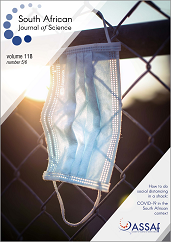Economic vulnerability and poor service delivery made it more difficult for shack-dwellers to comply with COVID-19 restrictions
DOI:
https://doi.org/10.17159/sajs.2022/13301Keywords:
COVID-19, informal settlement, South Africa, lockdown, pandemic, Afrobarometer, directed acyclic graphAbstract
In South Africa, demand for housing close to viable/sustained sources of employment has far outstripped supply; and the size of the population living in temporary structures/shacks (and in poorly serviced informal settlements) has continued to increase. While such dwellings and settlements pose a number of established risks to the health of their residents, the present study aimed to explore whether they might also undermine the potential impact of regulations intended to safeguard public health, such as the stringent lockdown restrictions imposed to curb the spread of COVID-19 in 2020 and 2021. Using a representative sample of 1381 South African households surveyed in May–June 2021, the present study found that respondents in temporary structures/shacks were more likely to report non-compliance (or difficulty in complying) with lockdown restrictions when compared to those living in traditional/formal houses/ flats/rooms/hostels (OR: 1.61; 95% CI: 1.06, 2.45). However, this finding was substantially attenuated and lost precision following adjustment for preceding socio-demographic and economic determinants of housing quality (adjusted OR: 1.20; 95% CI: 0.78, 1.87). Instead, respondents were far more likely to report non-compliance (or difficulty in complying) with COVID-19 lockdown restrictions if their dwellings lacked private/indoor toilet facilities (adjusted OR: 1.56; 95% CI: 1.08, 2.22) or if they were ‘Black/ African’, young, poorly educated and under-employed (regardless of their socio-economic position, or whether they resided in temporary structures/shacks, respectively). Restrictions imposed to safeguard public health need to be more sensitively designed to accommodate the critical roles that poverty and inadequate service delivery play in limiting the ability of residents living in temporary structures/shacks and inadequately serviced dwellings/settlements to comply.
Significance:
- South Africans living in temporary structures/shacks are more likely to be poorly educated and under-employed, with fewer assets and limited access to basic household services.
- Poverty and inadequate service delivery were more important determinants of compliance with COVID-19 restrictions than housing quality.
- In the absence of improvements in economic circumstances and the delivery of basic household services, restrictions imposed to safeguard public health need to be more sensitively designed to take account of the structural barriers to compliance experienced by households where poverty and/or inadequate service delivery limit their ability to stay at home; maintain hygiene; and/or practise social distancing.
Downloads
Published
Issue
Section
License

All articles are published under a Creative Commons Attribution 4.0 International Licence
Copyright is retained by the authors. Readers are welcome to reproduce, share and adapt the content without permission provided the source is attributed.
Disclaimer: The publisher and editors accept no responsibility for statements made by the authors
How to Cite
- Abstract 639
- PDF 1039
- EPUB 537
- XML 527
- Supplementary material 136












.png)